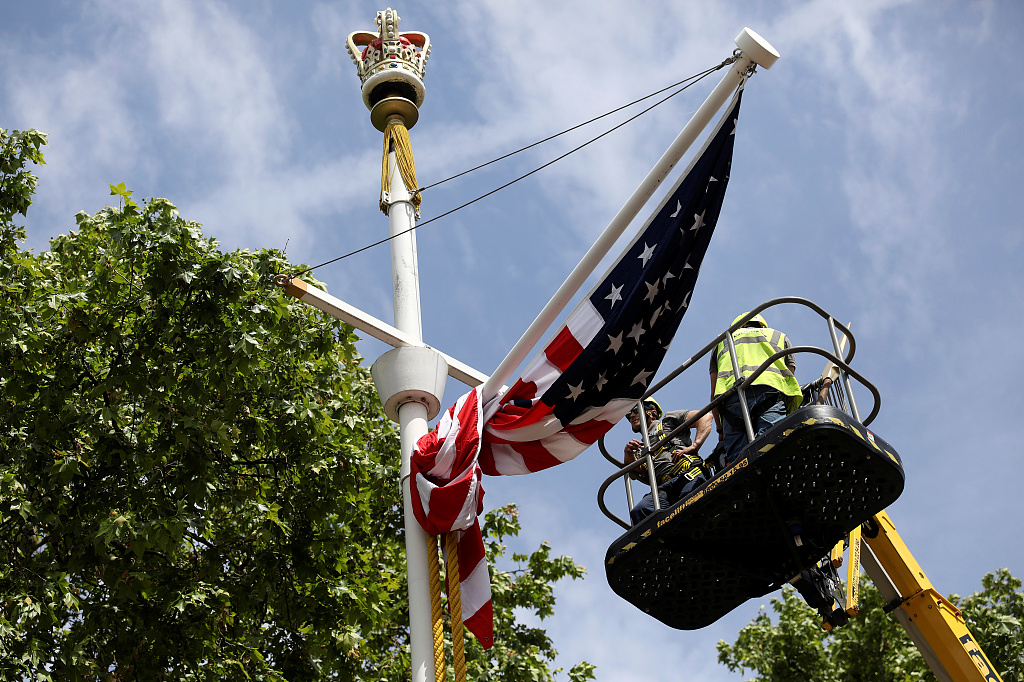

Editor's note: Tom Fowdy, who graduated with an MSc in Chinese Studies from Oxford University and majored in politics at Durham University, writes on the international relations of China and the Democratic People's Republic of Korea. The article reflects the author's opinion, and not necessarily the views of CGTN.
The news on July 19 emerged that Iranian authorities had seized a British oil tanker in the Strait of Hormuz. The situation, condemned by the British Foreign Office as "unacceptable," comes after a detention of an Iranian tanker by British authorities in Gibraltar on July 5. Tehran authorities have argued that the ship was engaging in "illegal activities"– something which Britain denies. The incident marks the latest escalation in an ever growing crisis in the Persian Gulf in the midst of an assertive U.S. policy towards Iran commencing with Washington's withdrawal from the Joint Comprehensive Plan of Action (JCPOA).
Britain has responded to Tehran's decision in a highly offended and authoritative manner, acting as if the events which preceded it simply didn't happen or are of no significance whatsoever, or for that matter, that the United Kingdom has a right to make assertive moves against other countries, but it is unacceptable if they reciprocate.
The culprit lies in the outdated foreign policy logic which assumes Britain is still a law and leader unto the world which may put other countries in line, yet be answerable to nobody. Although the days of the British Empire are long gone, its institutional memories continue to persist in the country's statecraft, taking a new representation in the form of Britain's relationship with Washington. However, Britannia doesn't rule the waves anymore, and these ambitious foreign policy quests will soon catch up to it.
What is the "special relationship?" and why does it continue to matter so deeply in Britain's perception of the world? Its ties with Washington are not just based around the connotations of a common cultural heritage, but an authoritative nostalgia for empire. Although it would be misleading to conflate the foreign policies of the two nations as the same or for that matter equal (there are some differences), nevertheless some voices in London continue to persist with a set of norms that Britain's relationship with the U.S. ought to be conceptualized as a "duty"– that is Britain has a moral responsibility to assist America in being a law and "authority" unto the world.
Thus for these people, the UK and the U.S. should ideally work "side by side." Their voice is the dominant one and consequentially, excluding the Vietnam War (when the left leaning government of Harold Wilson had the day), such a mindset has seen Britain support every single American military venture since World War II, including the illegal invasion of Iraq in 2003.

Workers hang a U.S. flag on the Mall towards Buckingham Palace in central London in advance of U.S. President Donald Trump's state visit to Britain, London, Britain, June 2, 2019. /VCG photo
Although this foreign policy logic has come under increasing strain owing to the unpopularity of the Trump administration, as illustrated by the controversy over Sir Kim Darroch's leaked comments, nevertheless the Conservative Party government has sought to endure and sustain warm ties with Washington, motivated in turn by the diplomatic weakness brought about by Brexit. This situation made them overtly tolerant of Trump's behavior even in the face of striking differences between the two countries.
Iran has proved to be a flashpoint in this situation. On paper, the United Kingdom still officially supports the JCPOA nuclear deal and was opposed to Washington's withdrawal of it. However, as the Trump administration has sought to dramatically escalate tensions in the Persian Gulf and pursue confrontation with Iran, London has seen opportunity in the situation: that is by also acting "tough" against Tehran with the goal of impressing Washington. With Jeremy Hunt, the foreign secretary, also pursuing leadership of the Conservative Party, this has also increased the opportunism vested in the situation.
Therefore, that Britain should provoke Iran by seizing one of its ships, only to receive the same action in turn and then play the victim is a stunning act of hypocrisy. Vested so heavily in the hyperbole of the special relationship, London still believes it is a law unto the world. However, this rhetoric is doing it no favors. It is diplomatically and economically estranged from Europe in the midst of Brexit, and no amount of subservience to Washington is changing the Trump administration's coercive attitude towards the country, that demands the UK ban Huawei and take actions against China in exchange for a "trade deal."
Clearly, Britannia does not rule the waves anymore. The United Kingdom, so fixated and obsessed with the idealized grandeur of its relationship with America, is simply not able to come to terms with its real position in the world anymore. In turn, the United Kingdom is finding itself locked in a number of bizarre ventures which it cannot possibly win. Brexit of course, is the crown jewel and epitome of it all.
Thus, in summary, the continuation of this foreign policy logic, which is likely to perpetuate into its apex in the pending of the Boris Johnson premiership, will in the long run pose severe costs upon the country and is already risking its internal stability.
(If you want to contribute and have specific expertise, contact us at opinions@cgtn.com.)

Copyright © 2018 CGTN. Beijing ICP prepared NO.16065310-3
Copyright © 2018 CGTN. Beijing ICP prepared NO.16065310-3